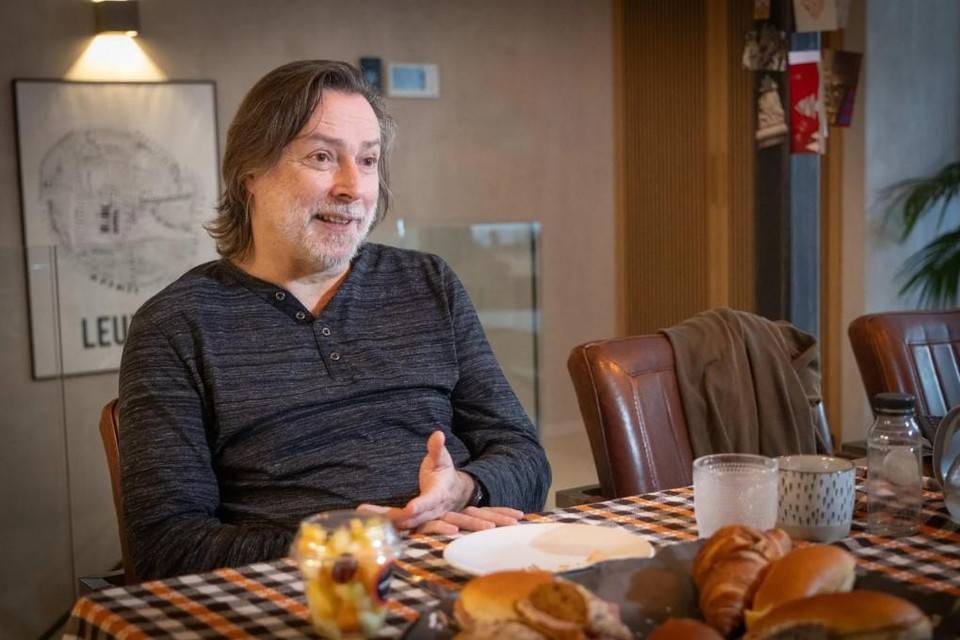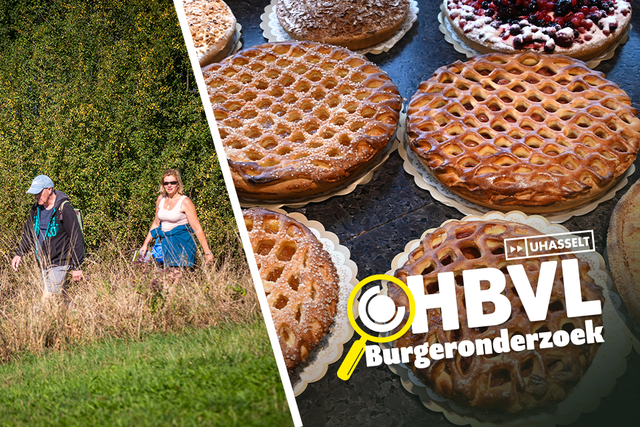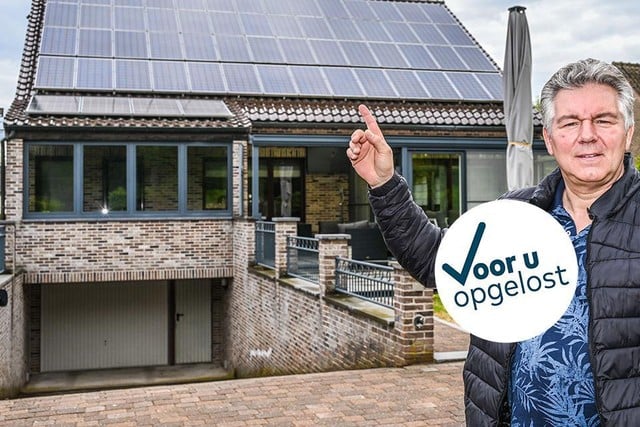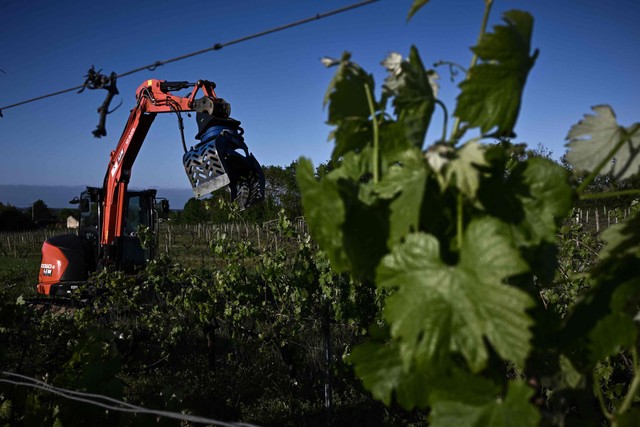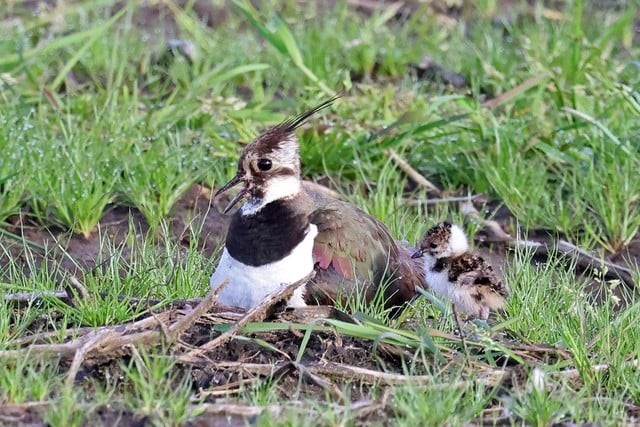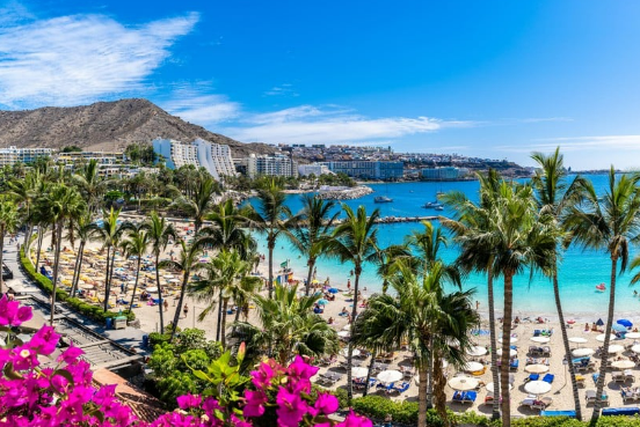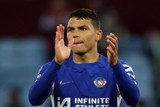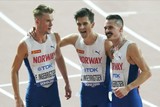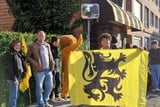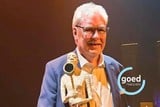Rudi Peeters — © Karel Hemerijckx
Breakfast with the Boss
Rudi Peeters (ex-KBC and Vandersanden): “I took a pay cut to go from KBC to Vandersanden”
Rudi Peeters (60), from Hasselt, taught Belgians Tnternet banking at KBC, surprisingly became CEO at brickyard Vandersanden and now, as a director at Colruyt, is concerned with our stomach contents. Driven by eternal curiosity, with Pippi Longstocking as his inspiration.
The bags for a trip to Costa Rica are ready in the cosy Leuven row house with a city garden. Peeters is entering his final days as CEO of Vandersanden. For more than two years, he commuted daily between Leuven and Bilzen. “Exactly 55 minutes, against the traffic jam in both directions. If I had to be at KBC’s headquarters in Brussels, I’d be on the road for longer,” he says, as Bo the dog comes over to say hello.
So you need to effectively clear your desk this week?
Rudi Peeters: ”Fortunately, I’m a very digital person, so there’s not much on it. (laughs) But I am making the transfer to my successor Johan Deburchgrave a matter of honour.”
Your education was not a direct path to the banking industry?
“I grew up in Runkst. My grandfather was a miner, but my father had infantile paralysis. With his club foot, he couldn’t go to work in the mine. He became a social worker and worked for the War Victims Service. My mother worked half-time at a notary’s office. My elder brother and sister and myself were always pushed to study. The sciences in particular fascinated me. I’ve always been very curious, but on the other hand, I didn’t know the difference between an oak and a beech. That’s why I started studying biology. And I did like how there were some alternatives in that direction. I was also in the anti-missile movement back then. And I joined in demonstrating against the construction of the A24. This interest in social issues was something I had inherited from home. My major was in botany, which is how I got to know about biostatistics. During my two years of civilian service, I then continued to study IT. I could then choose a job as a biostatistician at Janssen Pharmaceutica or start at CERA Bank. I chose the latter, because I was living in Leuven at the time.”
A nonconformist eco-biologist starting at a bank: a surprising choice, right?
“Absolutely. For my job application, I wore an oil jacket with stickers against nuclear power and a badge that said Fuck the army (laughs), and yet they hired me. I was also an anti-apartheid activist and after a few months I was commissioned for an automation around the South African border. I simply refused that, and yet I they didn’t throw me out. I did PC support for CERA for the offices and the provincial seats. When service chief Jules Liekens – Goedele’s dad – retired in Antwerp, I was asked to succeed him. Then came the early days of electronic banking. Phone banking, video text banking, things like that. Because I knew something about IT as well as the commercial side, I was given a small team to start that up for Cera. Before that, I was mainly looking at the market leaders of the time, KB and BBL. A bit like Toyota copying American brands, but making them a little better and cheaper. At one point, I then toured a number of American companies, such as IBM and Microsoft. At NeXT, I then met Steve Jobs for the first time. It was 1996. There was no Internet yet, but we started Internet banking anyway.”
Because you saw the possibilities?
“Yes, I did. Everyone was still working with modems and floppy disks back then, but I saw the potential of a platform-independent browser. The problem was that I had to convince management to invest. I just went knocking on the door of the management committee one day. Chairman Breesch said I was not on the agenda. My answer was: ‘True, Mr Breesch, but if you don’t listen to me right now, you’re going to regret it for the rest of your life.’ (laughs)”
Back then, did you envision banking as it is today?
“Honestly, no. But I believed in the technology, and we would see what came out of it. We had to get those browsers to our customers as well. I then made a deal with Microsoft. Netscape was still the market leader with their browser, and Microsoft wanted to rival them with Explorer. The deal involved them paying for the diskettes with Explorer, as well as shipping. And with IBM, I made a deal to allow our customers one hour a month of free Internet access for banking. But they couldn’t limit that, so that basically always meant free Internet for our customers. We just weren’t allowed to advertise that. So in fact, we were the first free Internet provider in Belgium and the first Internet bank in Europe. In fact, with CERA, we put the first 200,000 people in Belgium on the Internet. This was when people didn’t even know what the Internet was. When the merger with KB to form KBC came along, there was a long discussion about which platform would be chosen. It ended up being CERA’s, and I then became Director of Distribution Channels at KBC when I was 35. At the same time, the euro and the year 2000 were coming along. That was really fascinating, because ultimately the IT department is the real factory of the bank.”
Did it end up being what you envisioned at the time?
“I never thought it would go so fast. Technology is often overestimated in the short term and underestimated in the long term. When you see the effect on the number of offices, on transfers. Just think back: we were still scanning in remittances to send to the headquarters. Now, more than 90 percent of transfers are done by the customer themselves. You’d be crazy not to do it, too, because it’s so easy.”
The banking industry has also totally changed. Who would ever have thought you’d be sitting around at the weekend watching football footage on KBC’s app?
“We wanted the toothbrush principle for our app: you have to use it at least twice a day. If people were bored in the waiting room at the doctor’s surgery, they would have to open the KBC app. That’s how you get to know your customer better. We saw that happening all around us with big tech players like Google or WeChat in China. So the question was: do we wait for those big boys to take over everything here or do we get the lead out ourselves? If you wind down your branch network, you must offer something very valuable in its place or you’ll eventually lose your own distribution. If we can learn anything from companies like Google or Apple, it’s how they really focus on ease of use. Their view is: if people can’t type, that’s our problem, so we should take out the mistakes. If people don’t know French or English, we should just provide a translation. They make themselves responsible for everything. In the simplest way possible. With Google, you can find anything by searching in one little window. At the same time, they’re improving their artificial intelligence along the way, because data is the new gold, isn’t it?”
As for artificial intelligence, you had to tell people yourself to train a system that was going to make their own job obsolete?
“I don’t know about obsolete. When Excel came out, the accountants didn’t disappear either. Their work did become easier, though. So I think the purely administrative, annoying work will go away. And the interesting work will then float to the surface. That doom and gloom about lost jobs? There are going to be a lot more too. But those who will not retrain will be in the shit. Strong companies are therefore investing heavily in training their people. They know that if you don’t, you’ll be left with a lot of social liabilities that are more expensive than an education. And it actually has nothing to do with age. My mother passed away at 86, but still did online banking. Maybe also because her son was working on the couch. (laughs)”
Everything is changing so fast, of course, that it creates some anxiety in people.
“I get that, but that’s the new normal. For individuals, but also for our companies, which are experiencing one disruption after another: Covid, the energy crisis, wars, the construction crisis, etc. Imagine if tomorrow China invaded Taiwan... And so we’ve arrived at the basis of Darwinism: whoever adapts best to changing circumstances survives.”
THE example of that adaptation: your move from your trusted banking sector to a brick producer. Would you do it again?
“I haven’t regretted it for a moment. There were a few motivations. I’d been at KBC for 34 years and done everything there: IT, commercial roles, payments, marketing, during the banking crisis sold Fidea Insurance and Centea Bank, etc. I’m very grateful to KBC for all the training I received. Actually, it was easier to stay put, but my curiosity has always driven me. So you can’t blame yourself afterwards for not trying. To put it with a quote from Pippi Longstocking: ‘I’ve never done it before, so I think I can do it.’ I was CIO (Chief Information Officer – ed.) at KBC for 10 years and was involved in everything. At some point, I then decided within myself that I didn’t want to end up like this. Through a start-up I was mentoring, I then came into contact with Vandersanden.”
Did you have any other options?
“I was also able to work at a smaller chemical company. Money was not my guiding principle. I never look at what I can get, but rather what I need to live a happy life. I took a pay cut by going to Vandersanden, but I have more than enough. It’s easier when you’ve got that in life. I got some offers from headhunters where I could earn double, but then I’d have had to constantly fly around the world as CEO. I didn’t feel like doing that. Many people then still choose the lure of money, but lose sight of the quality of their lives. I want to enjoy my wife, my children, my grandson. I want to travel now. I did experience a few things around me that helped drive my decision to quit now. My spouse had breast cancer some time ago. I lost a good friend to liver cancer. That does get to you. I used to neglect my family by always working hard. I want to make up for that now.”
Is that still going?
“I think so. I do also think that my daughters, twenty-somethings, are proud of the route I’ve taken. They see me as honest, optimistic, someone who dares to make choices. These are also the values I want to impart to them: stay yourself, be creative and dare. Then the world is your oyster.”
Why did Vandersanden choose someone with your profile?
“There were apparently almost 200 candidates. I was among the final six, but was kind of a wild card in terms of profile. You know, the plans for the Pirrouet – the carbon-negative stone – were already in place then. I felt like I wanted to be a part of that. Working for a better world, that’s always been within me.”
What is the status of the factory for Pirrouet?
“The presses are being installed as we speak. Two months of trial operations will follow. The first orders are in; normally, the first bricks should be delivered in April.”
What has been your specific contribution as CEO in those two years?
“I obviously learned a lot myself and was able to lean on a strong management team. I worked mainly on structure in growth, on risk management, I brought the IT stuff up to standard, introduced the use of data in decisions, managed the gas crisis and strengthened group feeling among management. And while still maintaining the family character. At my last executive committee meeting, someone said I turned Paul McCartney and Wings into The Beatles again. That was the nicest compliment.”
Because you’re a Beatles fan?
“No, a Stones fan. (laughs)”
Do you have any other message for your successor?
“Make sure the family character doesn’t disappear, but think big about what we can do with Pirrouet. Building multiple factories, franchising abroad. Next to every steel factory in the world should be a Pirrouet plant, because the metal slag is the raw material.”
You will remain a Director at some top companies?
“First and foremost, at Vandersanden itself, because the family wanted me to stay on board. When it was announced that I was quitting as CEO, I also got some calls from Colruyt and Torfs, and then I took up directorships there.”
Notably, these are all family businesses?
“Yes, I really fell for the values they promote. I’ve been through a first board meeting at Colruyt and Torfs and am really impressed with how Jef Colruyt and Wouter Torfs are in life. An example: a director comes to Colruyt to present something and Jef’s first question was: ‘And how do you feel?’ Wouter Torfs also takes a very positive attitude towards his new CEO. So I immediately got the feeling there that I could speak my mind. They expect the same from me, in addition to contributing my digital knowledge.”
Retail, of course, is a very competitive industry?
“That’s right. You can have your values, but if you get into trouble with your suppliers, you just have to deal with that. That makes it a good thing for me to hold up a mirror to them. Top executive Johan Thijs of KBC used to say that I’m a kind of court jester from the Middle Ages. This was the person who was allowed to question the King. By the way, I had a great time during that Colruyt Board of Directors meeting, which lasted for two days. The things you learn there... For example, they not only talk about their market share, but also their ‘share of stomach’. That is, what percentage of our stomach is filled by supermarkets, how much by take-away or restaurants. And as to the stores, they want the largest share of the stomach. Great, right? I immediately launched that at Vandersanden: our ‘wall share’ should be as large as possible.”
By the way, did Johan Thijs talk to you about you never wanting to wear a costume?
“More than once. (laughs) But my message is always to stay yourself. In the business world, of course, you always have brown-nosers, but then what if that boss leaves? Then you see that entourage completely fall apart, because they’ve always gone upwards, regardless of any expertise. If you can do something, you’ll make it in life.”
Who is Rudi Peeters (60)?
– Former CIO of KBC and CEO of Vandersanden Brickyard. Now a member of the Board of Directors at Vandersanden, Torfs and Colruyt and Intesa
– Family composition: Rudi, with wife Anne Jacobs, is putting together a new family. He has one daughter and two daughters from a previous marriage (24, 25 and 26), and has one grandson (11 months). Anne is a civil engineer by training. They met each other at KBC. “So we’re a pair of banks.”
Rudi Peters’ breakfast ritual
“My breakfast consists of a glass of milk with Cruesli or a yoghurt with nuts. Meanwhile, I read the newspaper and my e-mails. I’m not really a morning person.”
Over a cup of coffee
What are your hobbies and interests?
“There are quite a few of those. As a biologist, I was once a nature guide. When we still lived at our house in Rotselaar, I was even the custodian of a nature reserve. I’d like to pick that up again. In part because I want to start identifying plants again. My microscope is still here. As a biologist, as it happens, my specialism was lichens and their contamination by heavy metals. I also brew my own high-fermentation beer with my son-in-law. And I like to visit festivals. From Nostalgie and the W-Festival to Tomorrowland, where I celebrated my 60th birthday with my daughters. Above all, I still want to learn a lot too, but also learn to do nothing.”
Do you still ride a motorbike?
“No – sometimes it itches when I see one, but I sold my BMW R1200GS because I wasn’t riding it enough.”
What is your favourite travel destination?
“We aim to make one big trip every year. I’m an avid skier, so I take regular ski trips with friends. And my wife and I bike or hike one trail every month that we’ve seen on Vlaanderen Vakantieland.”
Do you have any other dream destinations?
“In South America, those would be Argentina, Ecuador and Peru. In Asia, Nepal.”
Do you support any charities?
“I’m going to do some volunteer work anyway. At STUK arts centre, as well as helping my wife at the World Shop. With Vandersanden, we’re sponsoring the Maggie Shelters. These are high-quality tents for building refugee camps or to be used in earthquakes as schools or hospitals. I’ll helping to build them now too. Arnoud Raskin from Streetwize has also become a good friend. And I sit unpaid on the Board of Directors for Intesa, which guides and cares for people with disabilities. I always choose socially relevant projects.”
Do you have any regrets?
“Maybe that I never started my own business. In the IT sector, there have certainly been some opportunities. But if you never got that from your family...”
